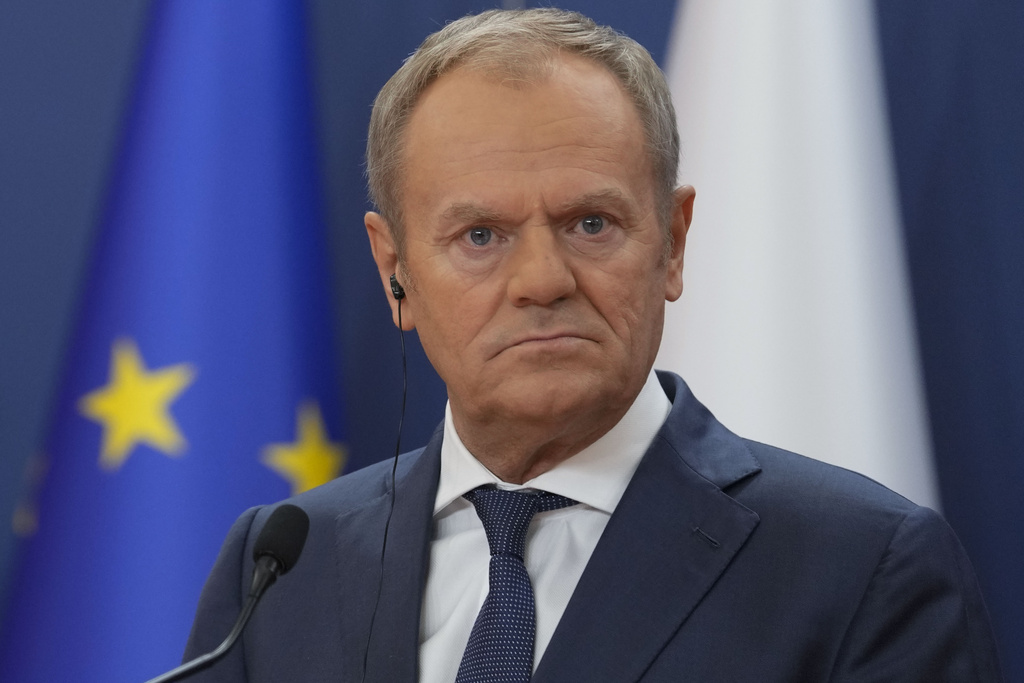Via the Ordo Iuris Institute for Legal Culture
Following the Polish parliamentary elections of Oct. 15, 2023, a new Council of Ministers appointed by an alliance consisting of the center-left Civic Coalition, the center-liberal Poland 2050, the agrarian Polish People’s Party, and the Left was appointed on Dec. 13, 2023, following eight years of rule by the more conservative United Right coalition led by Law and Justice (PiS). The new Polish government headed by Donald Tusk, acting on the basis of ad hoc resolutions passed by the parliamentary majority it controls, informal “guidelines,” and the opinions of friendly lawyers then took numerous unlawful actions over the following ten months that were aimed at physically eliminating the opposition from the public space. These actions have harmed the foundations of the democratic state of law, leading to a revolutionary order of “transitional justice” and “militant democracy.” Below we shall present a summary of the most important examples of such measures:
1. Attacking the independence of judges
Included in the draft regulation of the Minister of Justice, which is aimed at amending the Rules of Procedure of the Common Courts and dated Dec. 14, 2023 (the day after the new government took power in Poland), was an attempt to introduce a so-called “independence test” which would allegedly assess the impartiality and independence of the more than 2,500 judges who were appointed to their positions after the National Council of the Judiciary’s rules were changed under the previous government. This idea has recently returned in a draft law intended to regulate the status of judges. Judges would be expected to submit to “active repentance” – that is, to make a statement in which they admit that they went astray by applying to a constitutional body for promotions in an official capacity while the previous political camp was still in power.
As Justice Minister Adam Bodnar stated at the press conference where it was announced, “When they make a statement saying that they had made a mistake, they will then voluntarily return to the court where they previously adjudicated, but nothing more will happen with respect to them.” These judges will thus be “absolved.” Those who do not actively repent can expect sanctions.
The Venice Commission issued an opinion on this on Oct. 14, 2024, in which it stressed that the evaluation of the judges’ work must always be conducted on an individual basis and that group dismissals are not possible. In addition, any negative evaluation must be subject to judicial review at the request of the person concerned. The evaluation should also be carried out by an institution that is independent of the executive branch of government.
Solutions that allow the status of some judges to be questioned based on undefined criteria constitute a blatant violation of the guarantees of judicial independence and the independence of the courts. According to Article 178(1) of the Polish Constitution, judges, in the exercise of their office, are independent and subject only to the Polish Constitution and laws. In turn, Article 180(1) of the Polish Constitution stipulates that judges are irremovable, which is a fundamental guarantee of judicial independence.
For more details on this, see:
- “Test of Independence” – a means of making judges dependent
- Poland – Joint Opinion of the Venice Commission and the Directorate General Human Rights and Rule of Law on European standards regulating the status of judges, adopted by the Venice Commission at its 140th Plenary Session (Venice, 11-12 October 2024)
2. The forceful takeover of the public media
Under a resolution of the Polish Sejm that was passed on Dec. 19, 2023, “regarding the restoration of legal order and the impartiality and integrity of public media and the Polish Press Agency,” an unlawful attack on the public media was launched. On the same day the acting Minister of Culture and National Heritage, Colonel Bartłomiej Sienkiewicz, given that he was the body exercising the State Treasury’s ownership rights over the public media (which owns 100 percent of the shares in these companies) and acting under the provisions of the Commercial Companies Code, dismissed the then-presidents of the management boards of Telewizja Polska S.A., Polskie Radio S.A., and Polska Agencja Prasowa S.A., as well as the entire management boards of these companies. The minister then appointed new management boards in their place, which in turn appointed new boards of directors for these companies. The minister’s actions were undertaken in violation of statutory provisions. On April 8, 2024, Telewizja Polska S.A. (TVP) was formally “placed in liquidation” in order to facilitate the government’s assumption of control over it. This ran contrary to a Jan. 18, 2024 Constitutional Tribunal ruling which held that placing it in liquidation would be against the law. The following months have shown that this was merely a façade aimed solely at achieving political ends, as the company, once placed in liquidation, has continued to operate smoothly, invest, develop new programming, and has even attempted to expand – all while becoming a propaganda center for the dissemination of the new government’s messages.
For more details see:
3. Challenging the status of those judges who were appointed by the National Judicial Council after 2018
On Dec. 20, 2023, the Sejm adopted a resolution “on addressing the effects of the constitutional crisis in the context of the constitutional position and functions of the National Council of the Judiciary in a democratic state of law,” declaring that all resolutions of the Sejm between 2018 and 2022 regarding the election of members of the National Council of the Judiciary are null and void and that all members of the National Council of the Judiciary (NCJ) are being urged to immediately cease their activities within this body. This runs contrary to the fundamental constitutional conditions underlying the NCJ’s functioning (articles 186 and 187 of the Polish Constitution). On the same day – Dec. 20 – the NCJ declared that the Sejm’s resolution violates the Polish Constitution. The Venice Commission then affirmed that it is not possible to collectively remove judges who were appointed after 2018 from their positions and functions.
For more details, see:
- Statement by the National Council of the Judiciary
- Questioning the status of the National Council of the Judiciary
- Poland – Joint Opinion of the Venice Commission and the Directorate General Human Rights and Rule of Law on European standards regulating the status of judges, adopted by the Venice Commission at its 140th Plenary Session (Venice, 11-12 October 2024)
4. The nullification of the Constitutional Tribunal, including supplementing its judgments with annotations
In addition to ignoring the verdicts and rulings of the Constitutional Tribunal as described above, from the beginning of its tenure, Donald Tusk’s government has notoriously undermined the very status of the Constitutional Tribunal’s judges by means of attaching annotations by the institution that publishes their decisions (the Journal of Laws, which is issued by the Prime Minister) to recent Constitutional Tribunal rulings, stating that, “[i]n accordance with the rulings of the European Court of Human Rights, the Constitutional Tribunal is devoid of the characteristics of a tribunal established by law.”
On March 6, 2024, the Sejm likewise passed an unlawful resolution “on addressing the effects of the constitutional crisis of 2015-2023 in the context of the Constitutional Tribunal’s activities,” amounting to a denial of the Tribunal’s standing within the Polish legal order. On May 28, 2024, the Constitutional Tribunal ruled that such a resolution runs contrary to the Polish Constitution.
For more details see:
- An example of a Constitutional Tribunal ruling with a government annotation
- The resolution of March 6
- The Tribunal’s ruling on the resolution
- The violation of the independence of the Constitutional Tribunal
5. The unlawful annulment of the mandates of the MPs Wąsik and Kamiński despite a presidential pardon
On Dec. 21, 2023, Speaker of the Sejm Szymon Hołownia, the leader of one of the several parties that make up Donald Tusk’s government, unlawfully revoked the mandates of MPs Maciej Wąsik and Mariusz Kamiński, declaring them to be convicted criminals despite the fact that they had been pardoned by Polish President Andrzej Duda back in 2015. Hołownia upheld the decision despite the fact that both deputies had appealed to the Supreme Court, which on Jan. 4-5, 2024, declared the revocation of their mandates to be illegal. The Constitutional Tribunal further ruled on June 19, 2024 (ref. K 7/24) that the amendment to the Act on the National Center for Research and Development and the Act on the Law on Higher Education and Science (Journal of Laws, item 227) was unconstitutional due to the fact that those MPs whose parliamentary mandates had been illegally terminated by the Speaker of the Sejm were prevented from taking part in the vote on it. Thus, the law’s enactment violated, among other things, the fundamental principle of the rule of law: the principle of the public authority being subject to the law (Article 7 of the Polish Constitution).
For more details see:
- The verdict of the Constitutional Tribunal of June 19, 2024 (ref. K 7/24)
- The conviction of two Polish MPs in violation of the presidential clemency law and the principle of the separation of powers
6. The forceful takeover of the National Prosecutor’s Office
On Jan. 12, 2024, Minister of Justice Adam Bodnar summoned National Prosecutor Dariusz Barski to his office and handed him a document stating that the latter’s appointment to his post two years earlier – on Feb. 16, 2022 – by the previous Justice Minister, Zbigniew Ziobro, had allegedly been made in violation of the applicable regulations and thus had no legal effect. The purpose of this action was to circumvent the provisions of the 2016 Law on the Public Prosecutor’s Office, which explicitly stipulates that the National Prosecutor can only be appointed with the approval of the President of the Republic of Poland, and can only be dismissed with the written consent of the President of the Republic of Poland. On Sept. 27, 2024, the Supreme Court ruled that Minister Bodnar’s actions ran contrary to the law, and Dariusz Barski remains the National Prosecutor.
For more details, see:
7. The violation of MP Marcin Romanowski’s immunity as a member of the Parliamentary Assembly of the Council of Europe
On July 15, 2024, opposition MP Marcin Romanowski was detained on the order of a prosecutor acting under the authority of Minister of Justice Adam Bodnar. This ignored the fact that the MP not only has immunity as a Member of Parliament (which had previously been waived for him), but also a separate immunity as a member of the Parliamentary Assembly of the Council of Europe. Minister Bodnar stated that “immunities cannot ensure impunity,” but it was only on Oct. 2 of this year that the Parliamentary Assembly of the Council of Europe lifted Mr. Romanowski’s immunity, which means that any previous government action in his case was unlawful.
For more details, see:
- The statement by Minister Bodnar
- The communication from the Parliamentary Assembly of the Council of Europe
8. The Minister of Education issuing a regulation concerning how religion is taught in the schools without the required consent from churches and religious associations
On July 26, 2024, Minister of Education Barbara Nowacka issued a regulation changing the rules governing religious lessons in the schools. One of the controversial changes has been the possibility of bringing together students of different grades and year groups for religion lessons, which may be in violation of Article 96 of the Law of Dec. 14, 2016 – Education Law (Journal of Laws 2024, item 737, cons. text).
The method by which the regulation was issued violated Article 25 (paragraphs 3-5 of the Constitution of the Republic of Poland), which sets the rules for the state’s relations with religious communities in the Republic of Poland, as the Minister had not yet reached an agreement with the religious communities concerned before issuing the regulation. This constitutes a violation of the constitutional principle of the consensual regulation of state-church relations. On Aug. 30, 2024, the Constitutional Tribunal, at the request of the First President of the Supreme Court, issued an order suspending the regulation for so long as the application is pending. The Ministry has meanwhile announced that it will not comply with this order.
For more details see:
9. The issuance of unlawful “guidelines” calling for the maximum expansion of access to abortion in the form of an official press conference and publications
On Aug. 30, 2024, Minister of Health Izabela Leszczyna announced the publication of Guidelines on the Current Legal Regulations Concerning Access to the Pregnancy Termination Procedure during a government press conference. Addressed to hospital directors, chief physicians, and heads of departments, the guidelines include a “polite request” for them to be applied. The document assumes that the rationale concerning the health risks a pregnant woman faces when requesting an abortion on such grounds can be interpreted as broadly as possible. This rationale can be derived from “any area of health, both physical and mental.”
The document further states that hospitals will face financial penalties for not performing abortions of up to 550,000 zlotys (approx. $140,000 USD). The Minister of Health in fact has no authority under Polish law to issue such documents, however. The guidelines are thus not binding on the directors of medical facilities, hence only a “polite request to apply them.” The publication of such a document, along with giving the impression that it is valid as well as sanctions for non-compliance, is a violation of the principle of the rule of law and an usurpation of those powers that rightfully belong to the medical establishment itself.
For more details see:
- Guidelines on the Current Legal Regulations Concerning Access to the Pregnancy Termination Procedure
- The announcement of a 550,000-zloty fine for institutions that refuse to perform abortions:
10. The imprisonment of Fr. Michał Olszewski
Father Michał Olszewski, the president of the Profeto Foundation, which has received tens of millions of zlotys in funding from the government in order to build the Archipelago center for the victims of abuse in Warsaw, has been kept in pre-trial detention since March 26, 2024. According to the prisoner’s own account as well as his defense counsel, the priest has repeatedly faced terrible treatment bordering on mental and physical torture. Among other things, the clergyman has had problems contacting his lawyer, was denied food for dozens of hours at a time, and was forbidden to use the toilet.
For more details, see:
- The communication from the District Prosecutor’s Office in Warsaw
- The opinion of the Ordo Iuris Institute
11. Donald Tusk’s attempt to “withdraw his countersignature”
Prime Minister Donald Tusk, in accordance with the Constitution of the Republic of Poland, signed the President of the Republic of Poland’s decision which was dated Aug. 17, 2024, No. 1131.18.2024, regarding the appointment of the chairman of the assembly of judges of the Supreme Court’s Civil Chamber. It was published in the Monitor Polski (the official gazette of the government of the Republic of Poland) along with a note concerning the signatures of both the President of the Republic of Poland and the Prime Minister. On Sept. 9, however, Tusk announced on X (formerly Twitter) (sic) that he had “decided to rescind the countersignature” despite the fact that the Polish legal system does not provide for this possibility. The next day, a Supreme Court spokesman, like the vast majority of respected constitutionalists, officially declared that Prime Minister Tusk’s action was unlawful.
For more details, see:
12. The failure to recognize those legal verdicts which are inconvenient for the new authorities
On a number of occasions over the past year, representatives of the ruling camp have selectively recognized or disregarded the judgments of the Constitutional Tribunal and the Supreme Court. This was the case, for example, with Minister of Justice Adam Bodnar, who has ignored the Constitutional Tribunal’s verdict of March 25, 2019, ref. K 12/18, in which the Tribunal stated that the then-new law on the National Council of the Judiciary is compatible with the Polish Constitution. It is worth recalling that in 2021 Adam Bodnar, still an ombudsman, indeed respected the same Constitutional Tribunal’s judgment when it had ruled that the provision allowing the ombudsman to perform tasks after the expiration of his term of office and until a successor is elected – Article 3(6) of the Law on the Ombudsman – is incompatible with Article 209(1), in conjunction with articles 2 and 7 of the Constitution.
In January 2024, the Supreme Court’s Chamber of Extraordinary Control and Public Affairs overturned a ruling on the expiration of Maciej Wąsik’s mandate which was not recognized by Speaker Szymon Hołownia due to his doubts about whether the Chamber is a court. At the same time, however, the ruling coalition has not questioned the resolution that was issued a few days later by the same Chamber of the Supreme Court affirming the validity of the recent parliamentary elections, after which the opposition assumed power.
On Sept. 27, 2024, the Criminal Chamber of the Supreme Court ruled that Dariusz Barski was properly reinstated from retirement in 2022 by then-Minister of Justice Zbigniew Ziobro, meaning that it is still he who holds the position of National Prosecutor and not current Justice Minister Adam Bodnar’s nominee. In a tweet, the said minister supported the position of the National Prosecutor’s Office, with its new head – which does not consider this ruling to be binding.
For more details, see:






